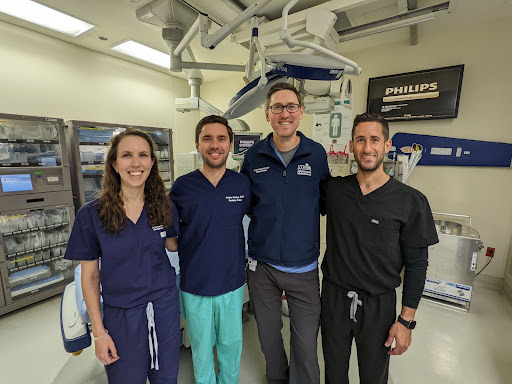Emergency Medicine faculty release award-winning ECG curriculum

A team of physician-educators in the Department of Emergency Medicine have released a novel application called ECG Stampede.
Practicing emergency physicians are tasked with rapidly and accurately determining the acuity of electrocardiograms (ECG) obtained on arriving patients – generally with little more information than the patient’s age and potentially their chief complaint. With this data, they must determine whether the patient can safely wait for evaluation, if they require a bed for immediate evaluation, or if a STEMI is identified and requires appropriate resource activation.
ECG Stampede was first launched in 2018 to tackle educating learners on this challenging skill. The initial design featured a gamified model where learners were presented with a series of ten ECG’s and were tasked with determining whether the patient could remain in the waiting room or required some escalation of monitoring or treatment. The game created a realistic simulation of a busy emergency department with scarce beds by constraining triage options.
The original version of ECG Stampede was well-received with over 50,000 games played and was awarded the Best Innovation award at a presentations at the Council of Residency Directors annual meeting in March 2019.
Since launch, the team which includes Catherine Reynolds, MD, assistant professor; Benjamin Cooper, MD, associate professor; Jonathan Giordano, DO, assistant professor; Tom Fadial, MD, assistant professor; have worked to develop ECG Stampeded 2..0 – a major expansion of the original concept which was released in January 2022.
The new ECG Stampede expands on the original concept to develop a complete curriculum for electrocardiogram education. The curriculum is video-based and is accompanied by a related textbook, now in its second edition. Learners are guided though essential topics (basic and advanced) with validated assessments gauging performance.
ECG Stampede also provides robust analytics for educators supporting incorporation into medical education curricula at McGovern Medical School and around the world. At McGovern, ECG Stampede is used in the Advanced ECG Interpretation and Clinical Application mini-elective to deliver a high-quality, well-received, remote learning opportunity for medical students.
One of the medical students at McGovern Medical School explained, “The videos were enjoyable to watch, and I liked the banter between the two physicians. I really enjoyed going through several ECGs and then the mini lessons following the ECGs. As a medical student, I haven’t experienced such a thorough and easy to understand ECG lesson until now.”
The ECG Stampede curriculum has also become the focal point of electrocardiogram education for trainees in the Department of Emergency Medicine and is completed by all incoming interns during the preparatory orientation period.
“My hope is for ECG Stampede to be the standard of electrocardiography training in emergency medicine,” Cooper said.
ECG Stampede has become a global phenomenon, with more than 400 registered learners from around the world completing thousands of hours of high-quality electrocardiogram education. Interested learners or educators can learn more and sign up for a free course at ECGStampede.com. There is also a companion ECG Stampede textbook available on Amazon for interested learners.